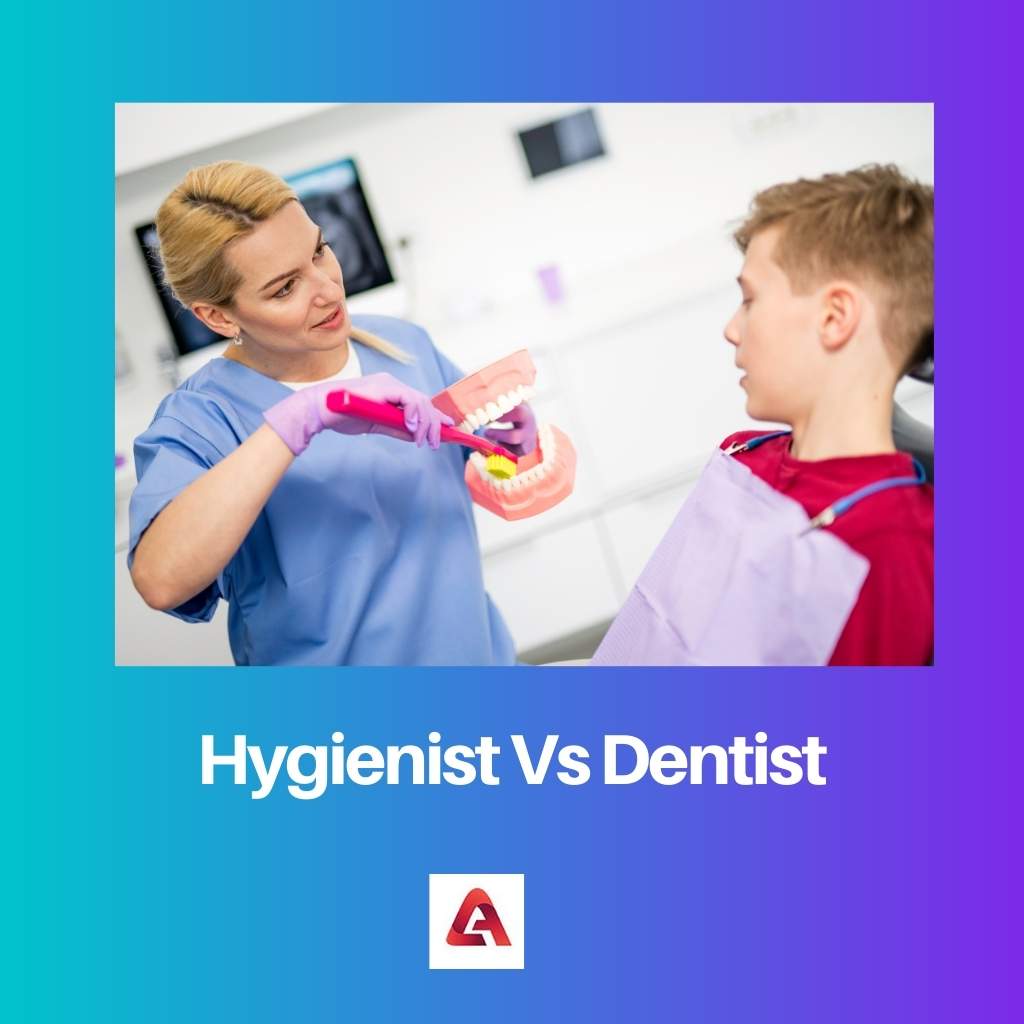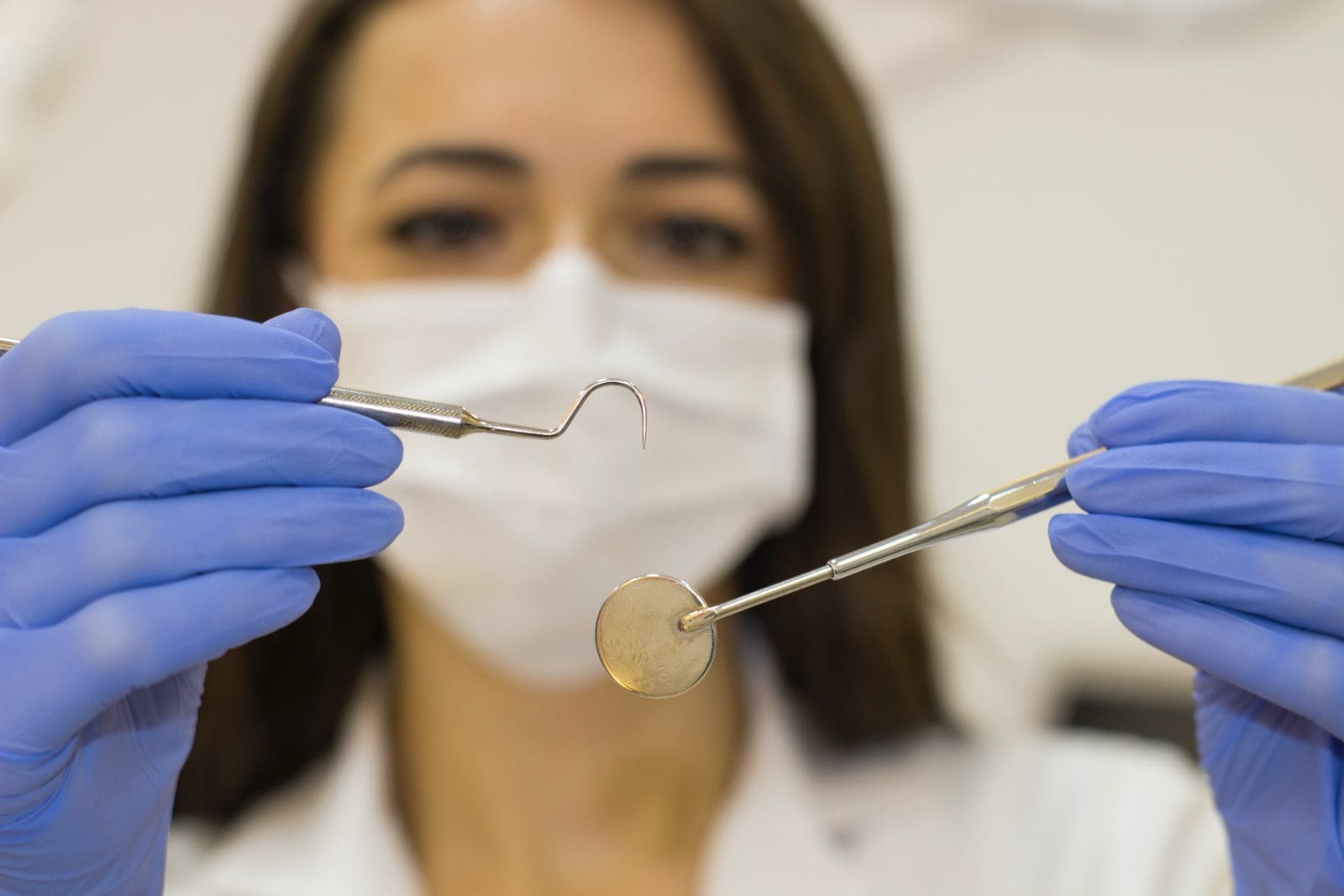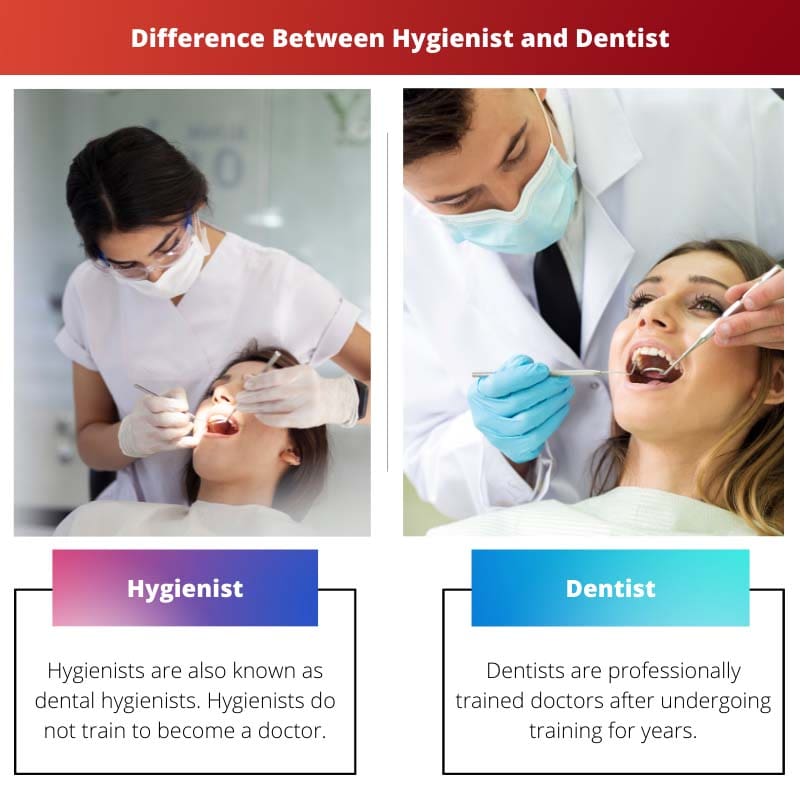Both the terms hygienist and dentist come under the general health category. Dental checkups and hygiene checkups are both important for a healthy oral, teeth, and overall life.
The hygienist and dentist’s scope of work is wider-ranging from oral cleaning to teeth treatment, not focusing on one task.
Key Takeaways
- Hygienists clean teeth, apply sealants and educate patients on oral hygiene, while dentists diagnose and treat oral health issues.
- Dentists complete more extensive education and training, enabling them to perform complex procedures and prescribe medication.
- Both professionals work together to maintain patients’ oral health but have distinct roles and responsibilities.
Hygienist vs Dentist
A hygienist is a person who is trained to provide the basic treatments of dental care, like cleaning teeth, but they are not trained to be doctors. They are also called dental hygienists. A dentist is a professionally trained doctor who takes care of oral diseases and conditions involving the gums and teeth.

Hygienists are also known as dental hygienists. Hygienists do not train to become a doctor. They are trained to provide services for basic treatments of dental care to hammer the aggression of dental caries, gingivitis, periodontists, etc.
A dental hygienist’s schooling and training are more focused on the task of cleaning teeth. Dentists are professionally trained doctors after undergoing training for years. They carry the widest range of dental treatments.
Dentistry involves providing treatment and surgeries regarding oral diseases and complications involving the teeth and gums or other underlying/escalating oral health issues. It also helps in restoring or replacing teeth.
Comparison Table
| Parameters of Comparison | Hygienist | Dentist |
|---|---|---|
| Definition | Hygienist works closely with a team of other dental professionals contributing to the various roles of being an educator, researcher, and administrator, etc. | A dentist is a doctor who works closely with the patients in assisting with various dental-related diseases and many dentistry services. |
| Years of Study | The duration of becoming a professional hygienist takes from 5 to 6 years, depending on the metrics of an institution. | It would approximately take up to 8 years to become a dentist. |
| Skills | The skills that a dental hygienist will master are performing and interpreting dental X-rays, assessing and performing oral cancer screenings, performing preventive and nonsurgical periodical procedures. | A dentist must master soft skills, including good manual dexterity, problem-solving, compassion, honesty, learning, business sense, and excellent communication skills, apart from industry-based skills. |
| Core Focus | The core focus is on the tasks of dental hygiene, supporting dental treatment, and oral treatment. | The core focus of a dentist is upon treating and diagnosing oral diseases, promoting oral health, prescribing medicines, and other activities revolving around dental care. |
| Years of Training | The training period takes at least two years to complete and to receive the training program certificate. | The training programs vary depending on the training school. At some undergraduate schools, it takes up to two years to finish the training program. |
What is Hygienist?
The hygienist, also known as a dental hygienist, doesn’t take much longer than it takes for a dentist to get trained and certified. It takes a minimum of three years and a maximum of four years to finish the dental hygiene program.
They are specialized in varied roles, and the best part is that dental hygienist gets to pick their desired role to work on. But, mostly, they are known for their clinical work.
The overall job of a hygienist is to collect information about the patient’s oral and medical health history, remove stains and plaque from all dental surfaces, and make moulds of the teeth.
Evaluating patient’s treatment to record the dental conditions of patients for the dentist. Application of preventive measures for fluorides and caries, administration of local anaesthetics, removal of sutures and dressings,
A dental hygienist also masters other sets of skills that contribute to treating patients with healthy dental care. An associate degree or bachelor’s degree in dental hygiene will give the status of a dental hygienist.
The responsibilities of a dental assistant and a dental hygienist are not similar. The nature of the work of a dental hygienist is more complex. Other dental hygienist duties include cleaning, scaling, and polishing teeth, taking X-rays, and educating patients on proper dental care.

What is Dentist?
A dentist is a professional dentist who specializes in the mouth’s area, teeth, gums, and related areas. Dentistry pertains to a whole of 9 departments. Oral medicine and radiology regarding oral disease diagnosis and radiograph.
Pedodontics includes all work on children below the age of 12, prosthodontics and implant department that incorporates the work of implants denture (complete and partial dentures) conservative, endodontics, periodontics, orthodontics oral & maxillofacial surgery, oral pathology, and microbiology are other departments.
The services offered by a dentist include oral and teeth examination, oral hygiene care, complete X-ray examination, dental cleaning, whitening, bridges, crowns, preventive dentistry, etc.
A dentist also offers the services of a dental hygienist. The total year of study comes to 8 years since it takes 4 years of undergrad and 4 years at a dental school to become a dentist.
Some dentists even pursue further studies to attain a specific status, such as endodontists, prosthodontists, and pedodontists. These programs vary accordingly.
The dentist profession allows one to be an entrepreneur and a doctor, which is why a dentist must possess a varied range of skills. Industrial skills are a must to be certified as a dentist, along with soft skills.

Main Differences Between Hygienist and Dentist
- Both are professionals, but we can term only a dentist as a doctor
- Earning an associate of science in dental hygiene can take up to a full two years, and a bachelor’s science degree in dental hygiene can take up to four years, whereas a dentist program would take around 8 years to complete. (undergrad 4 years plus dental school 4 years),
- A dentist can do everything that a hygienist does and not vice versa.
- A hygienist can perform all the tasks a dental assistant does, and a dentist can perform all the tasks that a hygienist and a dental assistant do.
- A dentist can diagnose things, and a hygienist mostly performs cleaning treatments.




